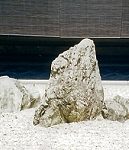
|
|
Nature
Of wide appeal is the unique beauty which can
be seen when plants and terrain are subjected to adversity (aged,
windswept trees, eroded rocks). The topography of the country itself
is highly significant, with it's many islands, mountains and rivers.
The Japanese seasons are clearly defined with mood and hue,
they celebrate the path of life. |
 |
 |
Sacred belief
In the Shinto religion
all of nature's elements; water, trees and mountains are inhabited
by spirits. Rocks, in particular are given important territorial and
sacred significance. Hindu cosmology tells of the mountain
Meru, at the centre of the universe. Chinese mythology of the
Isles of the Blest, where islands were carried on the backs of turtles
and immortals flew on the backs of cranes (both the turtle and crane
are symbols of longevity). The Buddhist faith of 'Pure Land'
has an afterlife paradise of palaces, gardens and ponds. |
Geomancy
One of the many Chinese influences feng-shui,
(chiso is a Japanese term) employs rules of layout and positioning
to endow a garden with good fortune; water flowing in from the north-east
and exiting in the west, would wash away evil spirits.
Architecture
They Heian style of Shinden and the Muromachi,
Shoin.
All of these influences can be seen at work in the Japanese garden,
sometimes symbolic and sometimes realistic.
Specific types of garden can also be identified: Pond gardens, for
boating or for strolling. Kare-sansui,
dry landscape gardens of sand and rock configurations for Zen meditation.
|
 |
|


